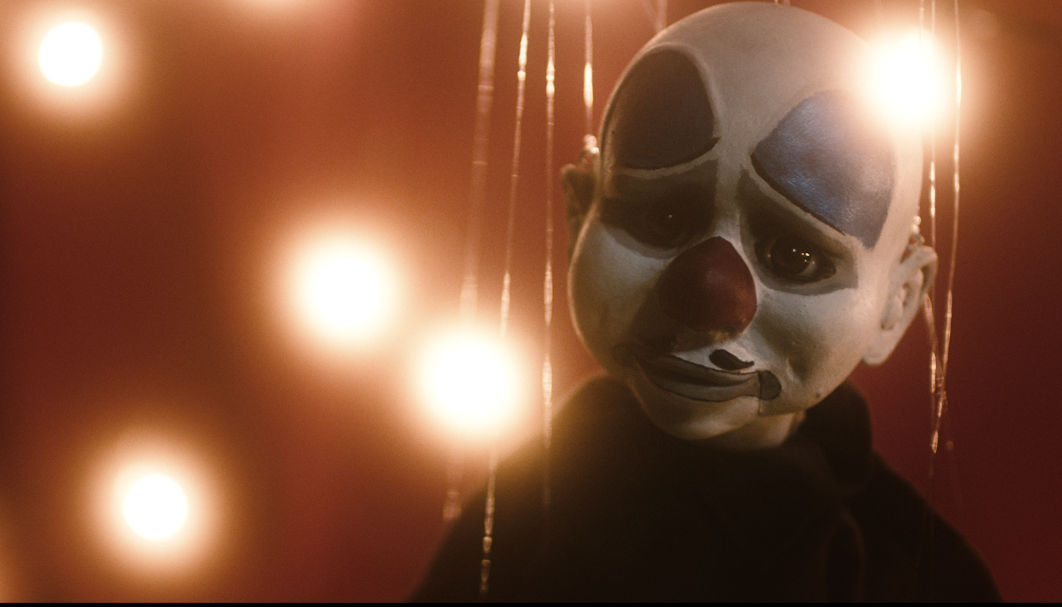
El triste
By Dharma Lemon
How far are you willing to go to be accepted? Would you be willing to go into debt to buy Christmas presents for people you barely know? How about trying the newest fad diet where you only eat three cookies a day? Or buying two hundred dollars worth of shoes to make you taller? Possibly, paying to get your nails done when you can barely make rent? These are all things I shamefully have done to be liked and I am willing to bet you have done similar things.
How do I easily come to this conclusion? Because I had a “mirror” turned toward me that made one of my biggest faults crystal clear:
I crave approval.
The “mirror” I am referring to, is called El Triste (Del Valle, 2020). The film takes place in the green rooms of a marionette show. It follows an pitiful, worn down marionette named,
“El Triste”(Cain Carias). He isn’t a sparkling show stopper or well liked by his fellow cast members, instead his unamusing performances get very little acclaim. During the thirteen minutes of this film we follow him as he navigates his low self esteem and reacts to his virtuoso marionette peers.
This “looking-glass” film mirrors our inherent need to be welcomed into society. Biologically it’s instinctual for humans to want to be adopted into our pack of peers, it obviously stems from our animalistic nature to survive. While this is a very humanistic nessciety, it has only grown more prevalent in our Gen-Z booming society where every waking moment is spent looking at people through the screen. Before the age of touchscreens, instagram, and social media influencers people were less concerned with:
Having eyelash extensions, a perfect blowout, and a purse to match every single outfit unless you were in the movie biz. Now, capitalism has found its way into everything we do. We consume ad’s from when we wake up and check our emails to when we google the recipe for beef casserole for dinner. These ad’s say you are good, but you could be better if your chest sat a certain way. I have no interest in slamming our society for their internet usage habits. As a self proclaimed diva I have to admit I find joy in my sybarite-like morning routine. I love the glamour of it all, but this is my personality. I can see how some people could feel a huge amount of pressure and stress in the idea of having to worry about half the things I do whilst preparing to head into the world. Ultimately I see social media as a tool. This tool can be used to reach many dejected, lonely humans. Even though a tool if used incorrectly can have adverse consequences I don’t want this review to shame you for waking up and having Twitter for breakfast. To sit here and criticize social media for its nuances would make the wrong message come across that I feel it does more harm than good which is not true. It brings people together, helps them realize their identity, and has probably even in extreme cases saved lives. Instead I will be objective and say that even things with healing properties can have negative side effects, the negative side effect being: Depression rates have nearly doubled in the last decade.
As someone who grew up heavily bullied in middle and high school, El Triste offers something I never thought I would receive from such a short film, which is closure. This is why El Triste is so imperative for people to see in a society where self esteem is so low. I call this film a mirror because we can see so much of ourselves in “El Triste”. The backstage imposter syndrome wrapped into an easy to digest film with must-see visuals. There is a scene in the movie that is almost reminiscent of one of your favorite childhood films, “Toy Story 2”. The montage shows a broken “El Triste” repaired by a meticulous artist that turns him into something he so desperately wants to be. Joyful haunting music plays behind the visual masterpiece to convey the importance of this huge change to him. The build up of this character you can easily empathize with explodes into a detailed sequence with rich imagery of marionette strings reflecting bright stage lights, entrancing music to set the mood, and even the precise color tones of the camera that acts cohesively with “El Triste”’s reactive mood changes tells a story of relatability.
This all so fantastical short film transcends race, gender, and age. I would show this film to my six year old niece and to my ninty year old great grandma. You don’t need to speak a certain language to understand the message or be a certain age, you just have to be a person. As humans we know or will soon learn there will always be someone better than you. We are fallible beings and no amount of surgery or money can completely rid us of that shame. In a world where we are constantly reprimanded to do better and contribute to the never ending cycle of it not being good enough, El Triste takes the form of a black sheep and asks:
How far are you willing to go to be accepted?
Dharma Lemon
Dharma Lemon is a writer and teaching artist from Los Angeles. Dharma is quirky and passionate. She writes about feminism, body positivity, the environment, and racial injustice. Dharma is inspired by writers such as Allen Ginsberg, Huey P. Newton, and Amari Baraka. She has performed at Firedrill Fridays with celebrity activists like Jane Fonda, Joaquin Phoenix, Rainn Wilson, and many others. She has also performed in “Artists for Amazonia” with Kali Uchis, Barbara Streisand, Morgan Freeman, and other celebrity activists. Dharma’s passion doesn’t just register in her writing but also her love for activism.



